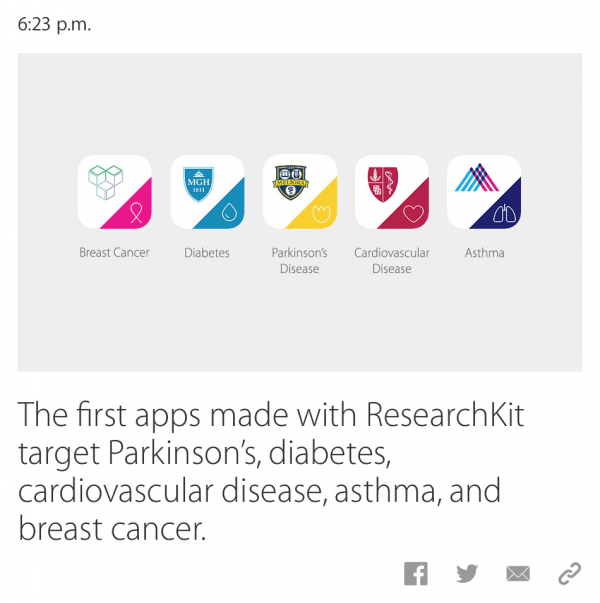
On Monday, Apple announced a new open source software framework called ResearchKit designed for medical and health research with five inaugural apps.The framework is designed to help doctors and scientists gather data more frequently and more accurately from participants using iPhone apps. With a user’s consent, ResearchKit can seamlessly tap into the pool of useful data generated by HealthKit — like daily step counts, calorie use, and heart rates — making it accessible to medical researchers.
According to Apple, medical researchers biggest hurdle is recruiting participants and infrequent data. Without large numbers, studies can’t generate the robust data needed to help them develop wider-ranging or individualized treatments. The ReserchKit platform could help simply recruiting to increase participants to provide a more useful representation of the population.
“iOS apps already help millions of customers track and improve their health. With hundreds of millions of iPhones in use around the world, we saw an opportunity for Apple to have an even greater impact by empowering people to participate in and contribute to medical research,” said Jeff Williams, Apple’s senior vice president of Operations in the official statement. “ResearchKit gives the scientific community access to a diverse, global population and more ways to collect data than ever before.”
The first five apps launched on ResearhKit focuses on Parkinson’s disease, diabetes, cardiovascular disease, asthma and breast cancer. Here is a look at ResearchKit’s platform first five apps:
1. Share the Journey developed by the Dana-Farber Cancer Institute, Penn Medicine, UCLA’s Jonsson Comprehensive Cancer Center, and Sage Bionetworks wants to understand the symptoms after breast cancer treatment, why these symptoms vary over time, and what can be done to improve them.
The app uses questionnaires and collect phone sensor data to track five common symptoms of breast cancer treatment that can persist even after active treatment ends: fatigue, mood and cognitive changes, sleep disturbances, and changes in exercise. The app will allow users to track these symptoms and others of their choosing, review trends, and provide your insights to researchers and the breast cancer community about how your symptoms might change day to day.
2. GlucoSuccess developed by Massachusetts General Hospital allows user to participate in a medical research study focused on Pre-Diabetes & Diabetes. The study team at Massachusetts General Hospital hopes that this app will not only further research into Diabetes, but also help you gain insight into how your behaviors affect your health.
The app helps users keep track of health behaviors important for people with type 2 diabetes, such as physical activity, diet, and taking your medicines. Data that you share through the app as part of the research study will create an unprecedented crowd-sourced database of health behaviors and glucose values from people just like you. Studying all this real-world data will help researchers understand how health behaviors influence blood glucose in real life, with a resolution greater than ever before.
Additionally, the app provides personalized insights into how your health behaviors relate to finger-stick blood glucose values, to help you manage your type 2 diabetes. By combining a personal app and a research study, GlucoSuccess will help explore how the iPhone can enable new kinds of clinical research.
3. Parkinson mPower study app tracks symptoms of Parkinson disease. Sage Bionetworks in collaboration with University of Rochester and Beijing Institute of Geriatrics. The app allows user to track their symptoms and take part in the world’s largest and most comprehensive study of Parkinson disease. mPower helps users track their symptoms by recording activities using sensors in your phone. These activities include a memory game, finger tapping, speaking, and walking. As a research instrument, activity and survey data from your phone are anonymously combined with data from many other participants to fuel Parkinson research at a scale never before possible.
4. MyHeart Counts app developed by Stanford University tracks and measures daily activity, fitness, and cardiovascular risk though the sensors in the user’s iPhone or the Apple Watch, or any wearable activity . By utilizing this app, consumers can better understand your own heart health and contribute to our understanding of how to keep hearts healthy around the world.Plus, using your cholesterol results and blood pressure, the MyHeart Counts app will provide a calculation of your risk for future heart attack or stroke, as well as a relative “heart age.”
5. Asthma Health developed by Icahn School of Medicine at Mount Sinai, provides a personalized tool for users to gain greater insight into your asthma, adhere to treatment plans, avoid triggers, and take charge of your health. The app provides personalized reminders for users to take their prescribed medications, helps tracks condition 24×7, allows users to review trends, and provides feedback on the user’s progress.
ResearchKit will be available to developers next month. For more information on ResearchKit, visit http://www.apple.com/researchkit/
